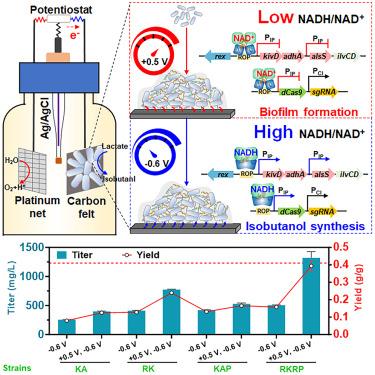电控还原当量分配促进 S. oneidensis 微生物电发酵中的异丁醇生物合成
IF 38.6
1区 材料科学
Q1 CHEMISTRY, PHYSICAL
引用次数: 0
摘要
高效定向供应还原当量对于高产生产所需化学品至关重要。在本文中,通过组装还原当量电控分配系统和异丁醇生物合成途径,模块化地构建了一种可生产异丁醇的 Shewaenlla oneidensis。首先建立了一个双阶段异丁醇电发酵过程,其中+0.5 V用于细胞生长,-0.6 V用于异丁醇合成。然后,构建了一个基于氧化还原生物传感器的动态调节系统,进一步解耦细胞生长和异丁醇合成阶段,实现还原等价物的有效供应。最后,设计了一个电控 CRISPRi 转录抑制系统来抑制竞争性代谢途径,从而使还原当量和碳通量定向分配到异丁醇的生物合成中。因此,异丁醇的滴度达到 1,321.5 ± 106.8 mg/L,比原始菌株提高了 10.8 倍,理论产量为 94.9%。这项研究通过微生物电发酵实现了还原当量的电控定向分布,并增强了还原产物的生物合成。本文章由计算机程序翻译,如有差异,请以英文原文为准。


Electro-controlled distribution of reducing equivalents to boost isobutanol biosynthesis in microbial electro-fermentation of S. oneidensis
Efficient and directional supply of reducing equivalents is crucial for high-yield production of desired chemicals. Herein, an engineered isobutanol-producing Shewaenlla oneidensis was modularly constructed by assembling the electro-controlled distribution system of reducing equivalents and the isobutanol biosynthesis pathway. A dual-stage isobutanol electro-fermentation process was first established, including +0.5 V for cell growth and −0.6 V for isobutanol synthesis. Then, a redox biosensor-based dynamic regulation system was constructed to further decouple cell growth and isobutanol synthesis phases, enabling efficient supply of reducing equivalents. Lastly, an electro-controlled CRISPRi transcription inhibition system was designed to inhibit competitive metabolic pathways, which led to directional distribution of reducing equivalents and carbon flux toward isobutanol biosynthesis. Thus, the titer of isobutanol reached 1,321.5 ± 106.8 mg/L, a 10.8-fold increase from the original strain with 94.9% of the theoretical yield. This study achieved electro-controlled directional distribution of reducing equivalents and enhanced biosynthesis of reductive products via microbial electro-fermentation.
求助全文
通过发布文献求助,成功后即可免费获取论文全文。
去求助
来源期刊

Joule
Energy-General Energy
CiteScore
53.10
自引率
2.00%
发文量
198
期刊介绍:
Joule is a sister journal to Cell that focuses on research, analysis, and ideas related to sustainable energy. It aims to address the global challenge of the need for more sustainable energy solutions. Joule is a forward-looking journal that bridges disciplines and scales of energy research. It connects researchers and analysts working on scientific, technical, economic, policy, and social challenges related to sustainable energy. The journal covers a wide range of energy research, from fundamental laboratory studies on energy conversion and storage to global-level analysis. Joule aims to highlight and amplify the implications, challenges, and opportunities of novel energy research for different groups in the field.
 求助内容:
求助内容: 应助结果提醒方式:
应助结果提醒方式:


